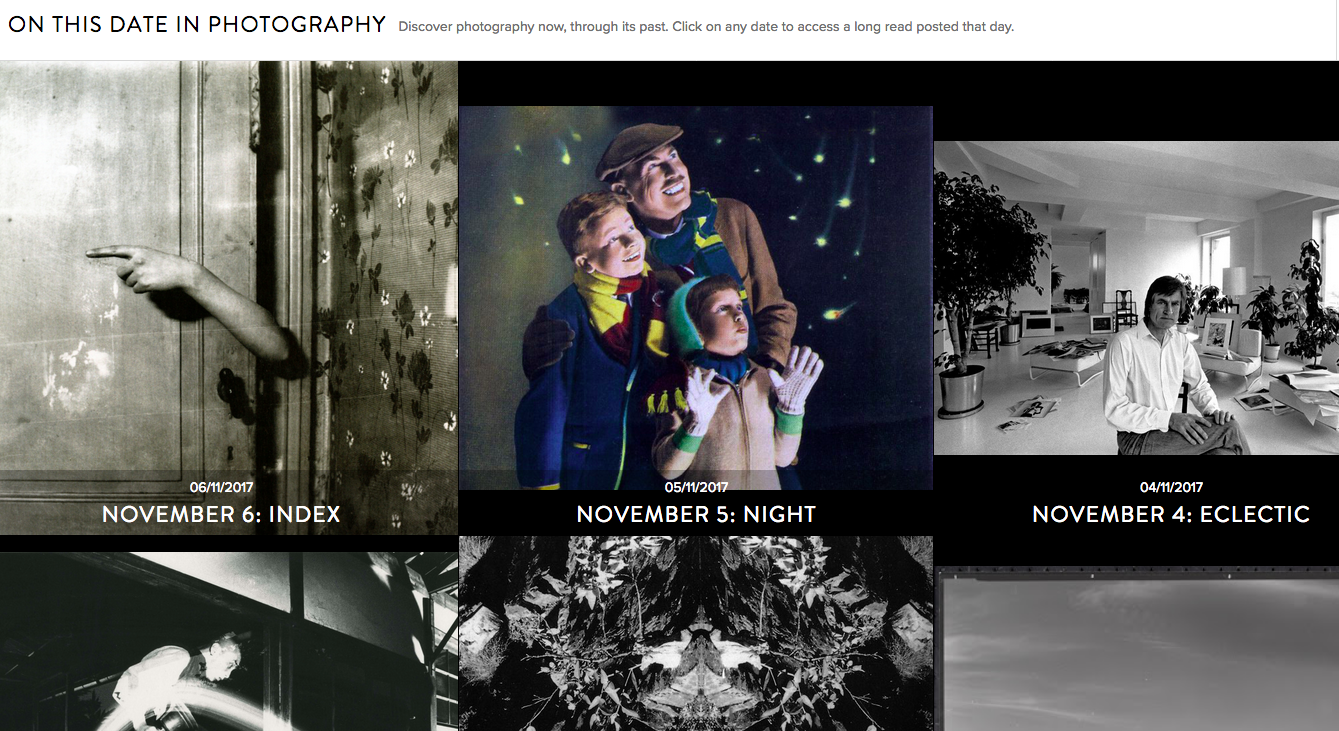On This Date In Photography is a remarkable blog written by Dr. James McArdle, artist and self-declared recovering academic - a retired Associate Professor from Deakin University, Melbourne, Australia. As the title suggests, each daily blog post takes the day's date as a starting point for offering rich servings from photography history. More than this though - and of particular relevance to A level students and teachers (with reference to the Personal Study) - is the manner in which James makes imaginative connections across times, places and personalities, many posts connecting rich historical research with contemporary references and concerns.
We were delighted when James agreed to share some insights into this wonderful resource.
What led you to create On This Day in Photography?
I decided to base the research and writing on one simple rule - it has to be something that happened or is happening on that date. That is what presents me with the possibilities for the day.
Where do you begin with your research?
Andrew Eskind and Greg Drake still edit http://photographydatabase.org based on 30 years of research compiled for American publisher of photography books G.K. Hall. It has expanded to include photographers world-wide. I find any resource needs double-checking, and that process of course is not wasted time - you just find out more.
David Lowe, Photography Specialist at the New York Public Library, compiles Photographers’ Identities Catalog (PIC) which has a global map interface that is idiosyncratic but actually very helpful once you get used to it.
If I am lucky there may be two or more photographers who were born or died on the day, a significant photo taken or an exhibition that all relate to each other in some useful way that triggers ideas that I would not have thought of otherwise - I am only too happy to be directed by coincidence since the accident of date is just that (unless you believe in astrology), and sometimes the ball just drops into place in this "calendric roulette”. It’s fun.
How do you start with your writing?
Then I research the biographies of the photographers which leads to discovering how they fit into history, including the political, social and technological environments of their country or city. I am eager to find statements by them about their work which I tag in my posts. Then, and only after I have formed and am comfortable with my own ideas, will I look at academic essays, online books, newspaper articles or critiques of the photographer or exhibition. I may quote them or summarise them, acknowledging the source, but because a blog is not an academic exercise, I don’t include a bibliography or footnotes, but I include links where I can.
At this point I have bits and pieces of writing that need to come together into a coherent whole. The theme of the post may only become apparent at this stage as the pieces are shuffled and come together. A little editing is needed then to look after tense and syntax. It is a matter then of writing the concluding paragraph. and after that an introduction that will fit into the character limit in Twitter..necessarily a very short, pithy statement with a picture that will find some interested readers; and even just that process of distillation will make me go back and revise or add ideas. A blog post is never set in stone.
Inevitably, once I read the post as it appears online, I may see mistakes and have to go back in and make corrections, and since this is an intense process, I have to be prepared for new information about the subject to pop up (since I am now sensitised to it), or for other ideas to form in the night or under the shower next morning.
The pressure of writing the next day’s post comes along and I start all over again.
Which photography writings have influenced you the most?
The first photography book I read in depth (and still read and consult) was Aaron Scharf’s Art and Photography - my mother gave it to me for my seventeenth birthday in 1968, the year it came out. It was his PhD at the Courtauld Insitute and must be one of the earliest of research at that level; meticulous. It’s illustrations were all monochrome in that edition. It was a lucid, convincing account of the way art and photography interacted - and made it clear that photography could be art.
I loathed Sontag’s On Photography for her supercilious pontificating, and that came out while I was a photography student and led to furious rows with other students who had been told it was God’s Word. Max Kozloff’s writing is clear and to the point, and I recommend in particular his 'Contention Between Two Critics About a Disagreeable Beauty' on Joel-Peter Witkin in his The Privileged Eye: Essays on Photography, University of New Mexico Press, 1987 for a demonstration of incisive critical writing.
A helpful history of photography is Nouvelle histoire de la photographie by Michel Frizot (Bordas, 1995), available in a fairly good English translation, which gives a world-view of the medium not found in others which tend to be more US-centric. More recent and both very readable are Charlotte Cotton’s The photograph as contemporary art (Thames & Hudson, 2004) which is thematic in a thought-provoking way and thus still relevant; and Photography : a critical introduction edited by Liz Wells, Fifth edition (Routledge, 2015) which contains essays by various writers organised chronologically and thematically. Really there is so much online, such as 1000Words (to which I’ve contributed) and American Suburb X, and countless blogs, that we are spoilt for choice.


 RSS Feed
RSS Feed